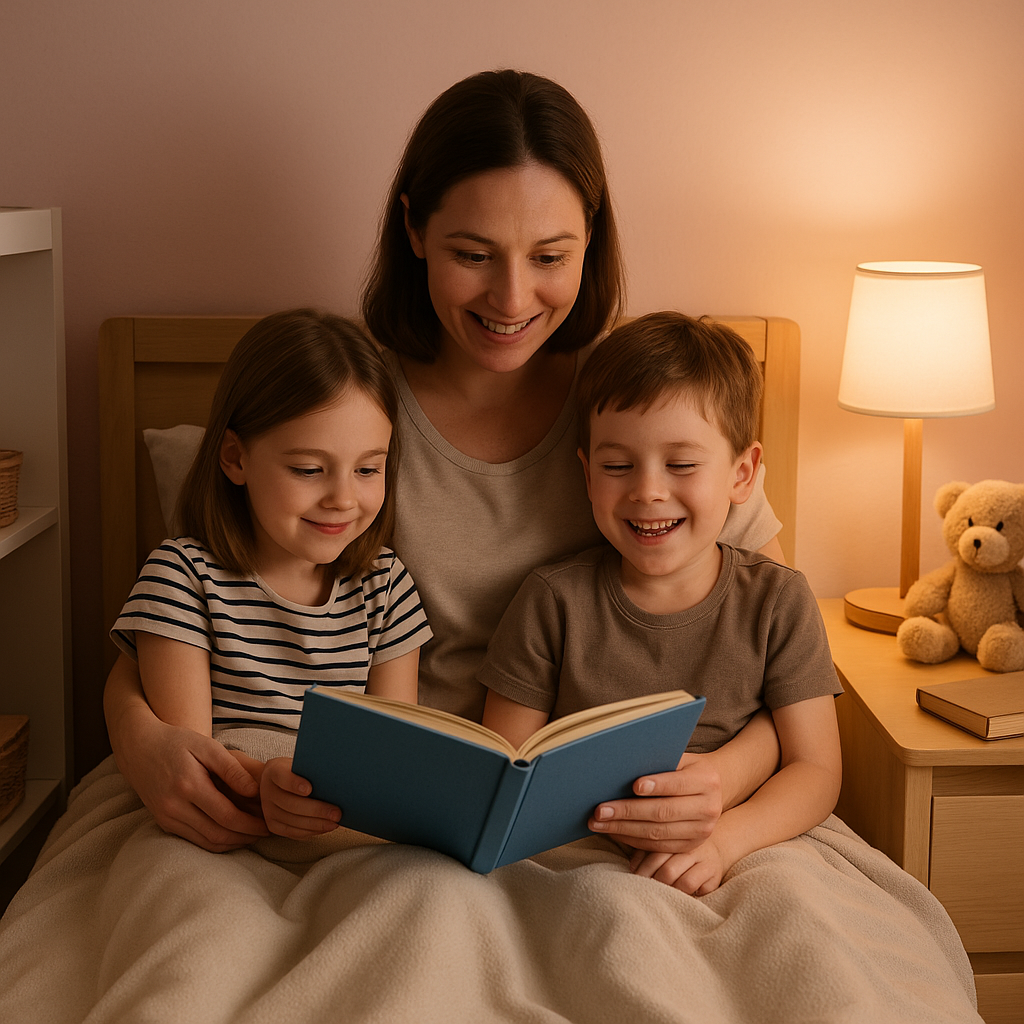If you could swap 30 minutes of chaotic scrolling for 30 minutes of calm, connection, and better sleep, would you try it for one week? Check out these tips and see for yourself!
Want the age-by-age science first? Read How Much Is Too Much? Screen Time & Kids and then come back to build your routine.
Why bedtime feels harder in the age of autoplay
Late-evening screens can delay sleepy signals, crowd out reading and conversation, and nibble away at sleep quality—so kids wake up crankier and less focused. Make bedrooms device-free, set a one-hour pre-bed curfew for entertainment screens, and build a predictable ritual that’s rewarding on its own (story, light stretch, soft music, short massage).
What about melatonin for kids?
It can help in specific situations with clinician guidance, but it isn’t a fix for inconsistent routines. Discuss dosing/timing with your provider, and store it like a medication. Your best first move is behavioral sleep hygiene; consider supplements as support, not a shortcut.

Nutrition basics that support calmer evenings
Magnesium: the quiet helper
Magnesium supports muscle relaxation and a healthy nervous system. Food first (leafy greens, legumes, nuts, seeds); supplements can complement when diets fall short. Explore our kid-friendly options in the VAL Happy Kids collection.
Iron: energy, attention, learning
Iron underpins oxygen transport and brain development. Insufficient intake may show up as fatigue and concentration difficulties. For kid-focused formats recommended by your clinician, see iron support inside VAL Happy Kids.
Meet VAL Happy Kids
Think of the VAL Happy Kids collection as a toolbox that complements routines:
- Chewable Magnesium (relaxation & calm): practical if kids dislike powders or liquids — shop magnesium chewables for kids’ sleep.
- Roll-On / Cream / Oil Spray (topical options): perfect for a 2–3-minute massage during wind-down — browse calming magnesium cream & roll-on.
- Melatonin + Magnesium Chew Tabs: consider after sleep hygiene is in place and with pediatric guidance — see melatonin + magnesium for kids.
- Aromatics (kid-safe diffuser blend, after-bath cologne, chest rub): cues that whisper “it’s bedtime now,” especially with dim lights and reading — explore gentle bedtime diffuser & aromatics.
- Iron Chewable: useful when there is low intake or deficiency risk as guided by your clinician — learn more in iron support for kids.
- Bone Broth Protein/Collagen: food-based support for soups/sips in the afternoon/evening — see protein & collagen options.
Build your “Calm Bedtime Stack”
Each stack layers behavior → environment → gentle support. Start with behavior; add products as needed. You can assemble everything from the VAL Happy Kids collection.
1) Budget-Friendly Stack
Behavior: screens off 60 minutes before bed; devices charge outside bedrooms. Read together 10–15 minutes.
Environment: dim lights, cool room, tidy space.
Support: one Chewable Magnesium with or after dinner if desired; start the bedtime diffuser blend 15–20 minutes before lights-out.
2) Gentle Sensory Stack (great for tactile kids)
Behavior: warm bath or washcloth routine; three gratitudes after the story.
Environment: white-noise machine; low-amber nightlight.
Support: Magnesium cream or roll-on during a 2–3-minute foot/leg massage; optional aromatic chest rub.
3) On-the-Go Stack (travel, sleepovers, sports nights)
Behavior: pack a mini routine (brush–book–breathe).
Environment: portable white-noise app; eye mask for older kids.
Support: Chewable Magnesium after dinner; swap diffuser for a light spray of kid-safe cologne on the pillow corner.
The 7-day bedtime reset
Day 1 — Map & agree
List evening friction points, choose a screen-free anchor, pick a stack.
Day 2 — Prep the environment
Remove devices from bedrooms; set a charging station; pre-stage books and PJs.
Day 3 — The nutrition swap
Serve a protein-forward dinner 2–3 hours before bed; keep late snacks light (yogurt, fruit, nut butter if age-appropriate). Add magnesium support if appropriate.
Day 4 — Ritualize the cue
Start your diffuser or massage at the same time nightly; kids thrive on predictability.
Day 5 — Co-wind-down
10 minutes of co-reading; one minute of box breathing (4-in, 4-hold, 4-out, 4-hold).
Day 6 — Troubleshoot
Check room temp, noise, and evening screen creep; reinforce the one-hour curfew.
Day 7 — Lock it in
Write your family media & bedtime plan; schedule a weekly review; celebrate wins.
How to choose between oral and topical magnesium
- Oral (powders/chewables): the more direct path to increase intake if diet is light on magnesium-rich foods — see kid-friendly oral magnesium.
- Topical (roll-on/cream/spray): a lovely sensory ritual — browse topical magnesium for bedtime massage. Many families use both: oral with dinner, topical at lights-down.

Two sample nightly routines
Sample Routine A (ages 4–8)
6:30 dinner → light play → bath
7:30 screens off → diffuser on → PJs/teeth
7:40 chewable magnesium with water (if using)
7:45 story + short foot massage with magnesium cream
8:00 lights out (white noise)
Sample Routine B (ages 9–12)
7:00 dinner → homework → pack bag for tomorrow
8:00 screens off, dim lights
8:10 reading (10–15 min) + magnesium roll-on to shoulders/calves
8:30 lights out, devices charging outside bedroom
FAQs
Do kids need a supplement to sleep?
Not necessarily. Start with behavior and environment. Supplements can support those habits. Discuss melatonin with your clinician and store it safely.
Could low iron affect focus?
Iron status relates to energy and development; low iron can present as fatigue and attention issues. Ask your pediatrician about testing and safe dosing.
Which VAL Happy Kids items should I start with?
A practical starter combo is Chewable Magnesium + Diffuser Blend; add a Roll-On or Cream if your child enjoys massage time.
Strong internal links & CTAs
- Back to Article 1: How Much Is Too Much? Screen Time & Kids
- Shop the collection: VAL Happy Kids — magnesium chewables, calming topicals, and gentle aromatics.
-
Build your Bedtime Stack: curate your picks from VAL Happy Kids (bundle page optional if you create
/collections/bedtime-starter-bundles).
Disclaimer
This content is educational and not medical advice. Consult your pediatrician before starting any supplement (especially melatonin or iron). Keep all supplements out of children’s reach.


Screen Time and Children: How Much Is Too Much? (Science, Age-by-Age Limits, and a 7-Day Reset)
How to Apply Magnesium Roll-On for Kids: Where, When, and How Often